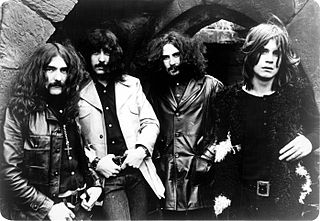
Black Sabbath were an English rock band formed in Birmingham in 1968 by guitarist Tony Iommi, drummer Bill Ward, bassist Geezer Butler and vocalist Ozzy Osbourne. They are often cited as pioneers of heavy metal music. The band helped define the genre with their first three albums Black Sabbath, Paranoid and Master of Reality (1971). Following Osbourne's departure in 1979, the band underwent multiple line-up changes, with Iommi being the only constant member throughout their history.

Paranoid is the second studio album by English heavy metal band Black Sabbath, released on 18 September 1970 by Vertigo Records in the United Kingdom and on 7 January 1971 by Warner Bros. Records in the United States. The album contains several of the band's signature songs, including "Iron Man", "War Pigs" and the title track, which was the band's only Top 20 hit, reaching number 4 on the UK charts.

Never Say Die! is the eighth studio album by English rock band Black Sabbath, released on 29 September 1978. It was the last studio album with the band's original lineup and the last studio album to feature original vocalist Ozzy Osbourne until the 2013 album 13. It was certified Gold in the U.S. on 7 November 1997 and as of November 2011 has sold 133,000 copies in the United States since the SoundScan era. The album received mixed reviews, with critics calling it "unbalanced" and insisting its energy was scattered in too many directions.

Master of Reality is the third studio album by English heavy metal band Black Sabbath, released in the United Kingdom on 6 August 1971 by Vertigo Records. It is regarded by some critics as the foundation of doom metal, stoner rock, and sludge metal. Produced by Rodger Bain, who also produced the band's prior two albums, Master of Reality was recorded at Island Studios in London from February to April 1971. Guitarist Tony Iommi and bassist Geezer Butler downtuned their instruments during the production, achieving what Iommi called a "bigger, heavier sound".
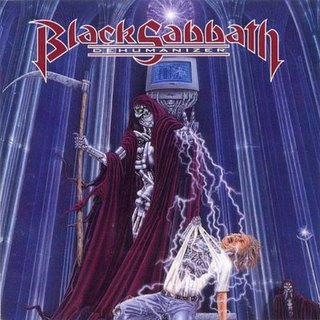
Dehumanizer is the sixteenth studio album by English rock band Black Sabbath. It was first released on 22 June 1992 in the UK by I.R.S. Records and on 30 June 1992 in the US by Reprise Records.

Mob Rules is the tenth studio album by English heavy metal band Black Sabbath, released in November 1981. It followed 1980's Heaven and Hell, and was the second album to feature lead singer Ronnie James Dio and the first with drummer Vinny Appice. Neither musician would appear on a Black Sabbath studio album again until the 1992 album Dehumanizer.

GZR was an American heavy metal band founded by and named after Black Sabbath bassist/lyricist Geezer Butler. The band has been marketed with three different names on different releases, g//z/r in 1995, geezer in 1997, and GZR in 2005. Most fans refer to the band as "geezer", although Butler himself refers to the band name as "gee-zed-R". This incarnation of the band is not to be confused with Butler's previous attempt in 1985 to form a solo band, then known as the Geezer Butler Band – the two outfits are largely unrelated.

Technical Ecstasy is the seventh studio album by English heavy metal band Black Sabbath, produced by guitarist Tony Iommi and released in October 1976 by Vertigo Records. The album received mixed reviews from critics but was a commercial success, peaking at number 13 on the UK Albums Chart and number 51 on the US Billboard 200 Album chart, later being certified Gold by the RIAA in 1997.
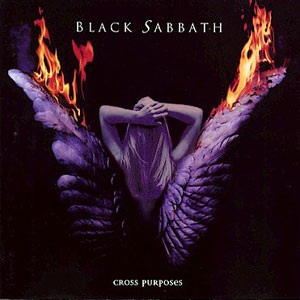
Cross Purposes is the seventeenth studio album by English rock band Black Sabbath, released through I.R.S. Records on 31 January 1994. The album marked the return of Tony Martin as the band's lead vocalist, after the second departure of Ronnie James Dio.

Black Box: The Complete Original Black Sabbath 1970–1978 is a collection of the first eight albums by the heavy metal band and a DVD of 4 videos. The set contains the albums recorded with original singer Ozzy Osbourne, who was fired in 1979 after completion of the band's Never Say Die! tour. This marked the end of the group's original line-up that featured Osbourne, guitarist Tony Iommi, bassist Geezer Butler and drummer Bill Ward. All eight albums are digitally remastered and repackaged in mock vinyl LP packaging, including an 80-page booklet with liner notes written by Henry Rollins, Chris Welch, and Brian Ives. The discs included in the set are as follows:

"The Wizard" is a song by the English heavy metal rock band Black Sabbath from their 1970 album Black Sabbath. "The Wizard" was selected as their debut single in France, backed by "Evil Woman" which was released as A-side in many other countries. It was also the B-side to the 1970 single "Paranoid", which reached number 4 on the UK Singles Chart and number 61 on the Billboard Hot 100.
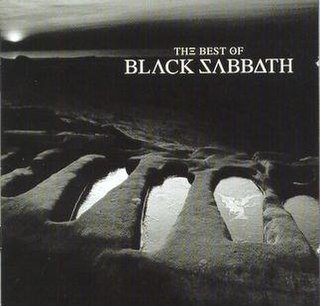
The Best of Black Sabbath is a double CD compilation album by Black Sabbath released in 2000 on the Sanctuary Records label. Its 32 songs are presented chronologically from the band's first 11 albums, spanning the years 1970 to 1983. Black Sabbath's classic six-album run, from 1970s debut Black Sabbath through 1975's Sabotage is celebrated with three to six songs from each album. Original vocalist Ozzy Osbourne's subsequent final two albums with the band, 1976's Technical Ecstasy and 1978's Never Say Die!, are represented by one and two songs, respectively. Replacement Ronnie James Dio's early 80's stint fronting the band on two albums is acknowledged with the title track of 1980's Heaven and Hell and a track from 1981's The Mob Rules. The compilation closes with a song from 1983's attempted rebirth, Born Again, former Deep Purple vocalist Ian Gillan's sole album with the band. The Best of Black Sabbath does not include any later material with vocalists Glenn Hughes, Tony Martin (1986–96) or the returning Dio.
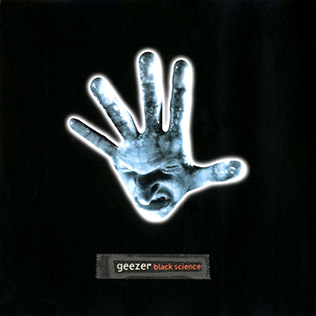
Black Science is the second studio album by heavy metal band GZR. It was released on July 1, 1997 by TVT Records. The cover art for the album is intended to represent the Black Sabbath song "Hand of Doom".

Plastic Planet is the debut studio album by GZR, a heavy metal band featuring Geezer Butler of Black Sabbath. The album also features Fear Factory vocalist Burton C. Bell.

Heaven & Hell was a British-American heavy metal supergroup active from 2006 to 2010, featuring guitarist Tony Iommi, bassist Geezer Butler, vocalist Ronnie James Dio and drummer Vinny Appice.
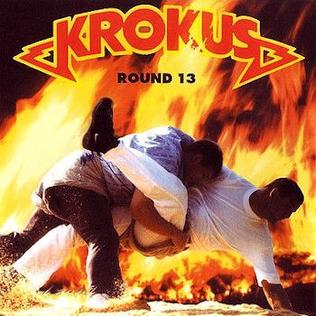
Round 13 is the thirteenth studio album by the Swiss hard rock band Krokus, and the only album to feature Welsh vocalist Carl Sentance, formerly of Persian Risk and the Geezer Butler Band. It includes a cover of "Heya" by J. J. Light.
"After Forever" is a song by English rock band Black Sabbath. The song was released on their third studio album Master of Reality in 1971, the lyrics were written by Geezer Butler while the music was written by Tony Iommi.

The Collection is a compilation album released by English heavy metal band Black Sabbath in 1992. The album was released on the label Castle, who released two CD versions of this album in the UK, both with the same cover art and songs. The album includes greatest songs of Black Sabbath with Ozzy Osbourne prior to his dismissal in 1979, from the eponymous album to Never Say Die!. The album has 15 tracks, two from Black Sabbath, two from Paranoid, one from Master of Reality, two from Black Sabbath Vol. 4, two from Sabbath Bloody Sabbath, two from Sabotage, two from Technical Ecstasy and two from Never Say Die!.

Device is the only studio album by American industrial metal band Device, a side project featuring David Draiman of Disturbed and former Filter guitarist Geno Lenardo. It was released on April 9, 2013, with their first single, "Vilify", out on digital download on February 19, 2013. The second single, "You Think You Know", was released on June 11, 2013.

"End of the Beginning" is a song by English metal band Black Sabbath, the opening track on their nineteenth studio album, 13 (2013).



















